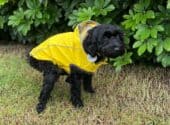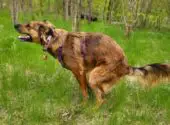There’s nothing quite as exciting as getting a new puppy is there? That feeling of driving to the shelter or driving to the pet store knowing your new best friend is waiting.
Or that feeling when you know your fluffy pride and joy is expecting puppies of their own. It’s the most exciting time of any pet owner’s life!
That doesn’t mean however it doesn’t pose challenges. You need to know what to look out for when raising a puppy, what to do and what not to do, and how to handle unusual situations.
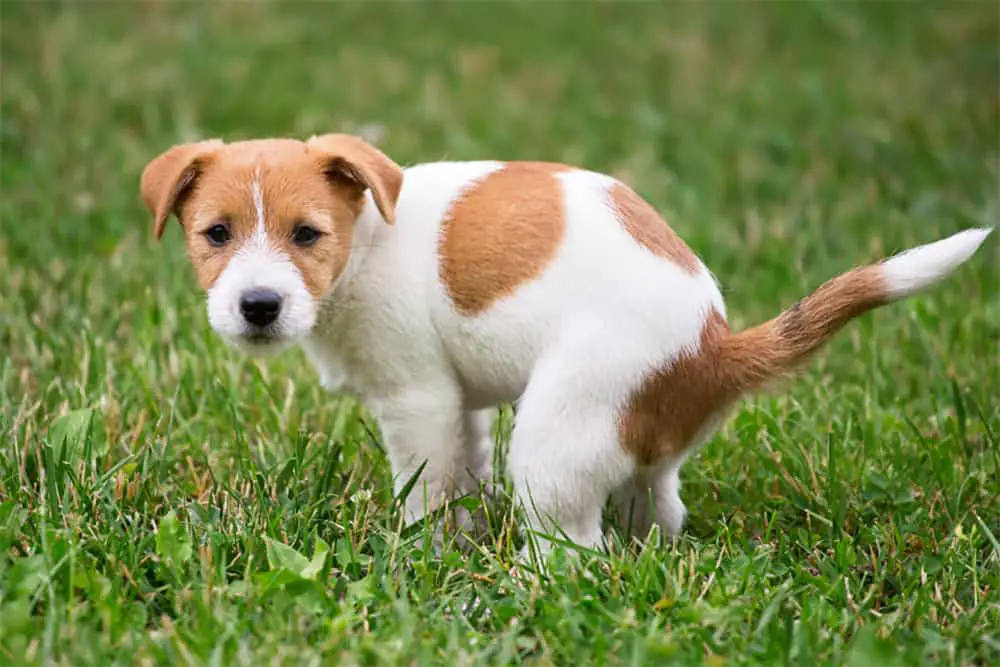
One thing to look out for if you’re a first-time puppy owner is your pup’s bowel movement. And one question you need to ask yourself is, how many times should my new pup poop?
This article will hopefully answer all your bowel-related questions and how many times your puppy should be pooping per day.
So How Often Is Too Often?
As a general rule of thumb, if your pup has normal bowel movements, it should be around five times per day, if they’re 6 months, 3 months, 8 weeks, or any age until it reaches adulthood.
But like humans, all pups are different so what is considered normal? Well here’s where this article is going to help.
Often, the younger the pup, the more they poop. How often they poop will depend on their age and dietary habits but if you find your pup’s bowels moving only once a day, that is a strong indication that they are constipated.
As your pup grows, however, this could become a more common occurrence as when dogs get older, they tend to poop less and less and have the ability to hold their bowel movements for far longer.
As the number of times a pup will poop depends on the diet, you’ll often find if you feed your pup a diet that’s high in fiber, they’re going to poop a lot more often, and so it is recommended to feed some high fiber food to those poor constipated pups to help get their bowels moving again.
You also might find yourself having to feed your pup more or less food, depending on how often they poop through the day. As puppies need more food than dogs, this leads to them pooping more often.
If your pup is eating around 3 meals a day, for example, you should be finding yourself cleaning up around 3 to 5 poops every day.
How Do I Know When My Pup Needs To Poop?
Not only does a pup’s diet indicate how much they should be pooping, but feeding time is often a good indicator of when they are going to be passing this poop too.
Usually, your puppy will need to poop around 30 minutes after eating a full meal but it’s commonly suggested that they can hold it one hour per month of age until they reach 8 months old.
However, bear in mind that this rule is not set in stone and if they need to go, they need to go. So be ready to take your pup out to poop 30 minutes after eating.
The type of food your pup is eating will also affect how long after eating your dog will poop.
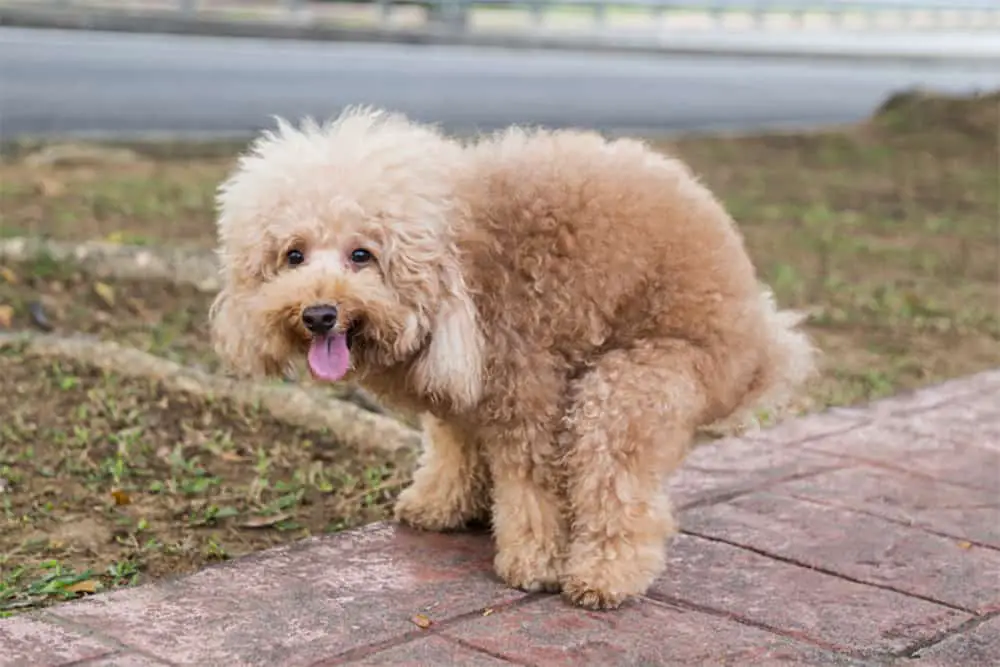
For example, wet food is much quicker to digest than dry food because of the high water content. So if you’re feeding your pup a lot of tinned food, which contains around 75% water, be prepared for your pup to poop more.
The same goes for muscle meat, the most common meat used in dog food and contains 75% moisture, so it’s always worth checking the nutritional information of your pup’s food if you need to keep an eye on their poop schedule.
Digestibility helps dog owners all over the world measure the nutrients a pup can absorb from the food they are eating and means highly digestible food results in less waste as your pup needs to eat less to meet their nutrient requirements.
This works both ways however and if your pup eats foods with lower digestibility, they may need to poop more often after a meal as they would have needed to eat higher quantities to reach their required nutrients.
Another guide to your pup’s poop schedule is to simply think of your own! Like most humans, your pup will need the bathroom first thing when they wake up as well as before they go to bed at night. So when you poop, your pup will need to too.
How Do I Housetrain My Pup?
Housetraining can be tricky, we know that, but there are a few signs to watch out for when you start and we hope by explaining them here in this article you’ll be prepared.
Whining
Whining is a dog’s language to tell you there is something wrong. Just like how babies cry. Howling and whining by the door, by the side of the sofa, or around the house means they need you for something.
This something is more often than not help with their bowel movements! When they need to go, they’ll tell you so don’t ignore them.
Restlessness And Pacing
Puppies really can be compared to humans on so many levels. Just like us, they get agitated if something is wrong and you might find your puppy distracted and agitated when trying to find a place to poop.
Often, when this happens, you’ll find them sniffing the ground too. If they’re old enough to realize the door leads to the outside, you might even find them pacing by the door, and this means they need to exit to poop!
Circling
Is your puppy circling a lot? Don’t ignore this and take immediate action! Especially if they’re circling on something you don’t want to get ruined. Circling means they’re going to go.
They’ve found a place and they simply cannot hold it any longer, so it’s in your best interest to move them quickly.
Tell them ‘no’ so they get used to this disciplinary term, and then move them outside so they know what they’re doing is wrong in the future.
Squatting
Well, this is just the final straw. You’re too late if you’ve reached this stage and they’re just going to go where they are, tough luck, but you weren’t fast enough!
If your pup starts to squat, they’ve assumed the position and are ready to take action. However, if you move really quickly and scoop them up, you might just save that brand new carpet after all!
What Does A Normal Poop Look Like?
Wondering what’s normal and what isn’t is common for even the most experienced dog owners, and knowing what is a healthy bowel movement can help in the long run when it comes to your pup’s health and wellness.
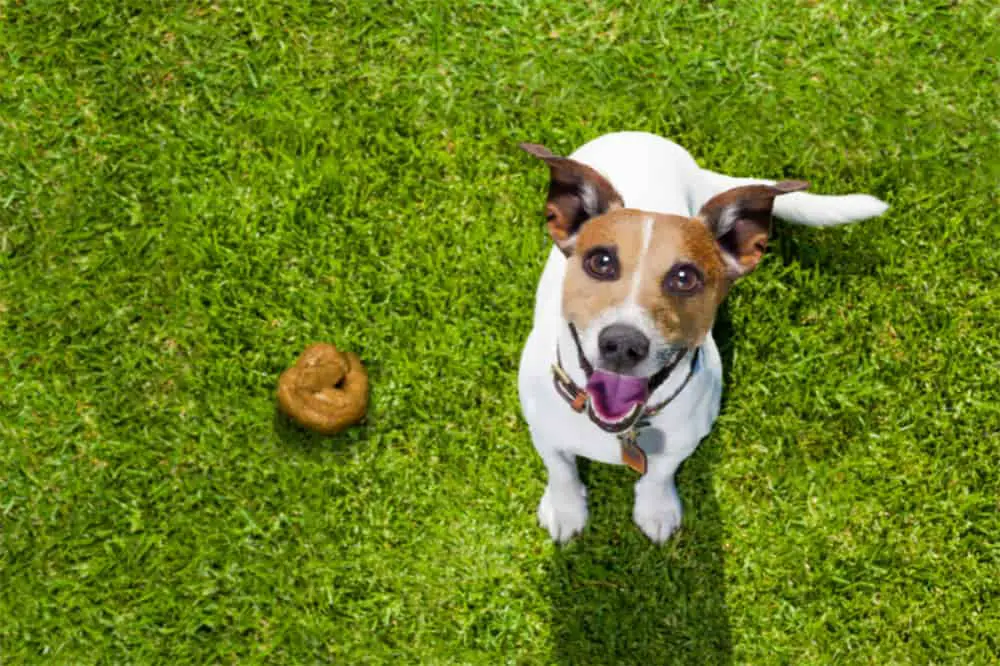
There are a few things to consider when analyzing if your pup’s poop is normal, from color, to consistency, to smell and the amount.
Color
- If your pup’s poop is normal, like human poop, it should be medium to dark brown. Any other color is something you should get checked out by a vet, especially if there is no direct correlation to why it has changed. This means if you find your pup is pooping black, gray, green, yellow, red, or white, something could be wrong.
- But don’t panic, it’s not always as bad as you think. If your pup’s poop is still a normal brown but has green bits in, it’s likely just grass! Just like if there are white pieces in your poop, it could just indicate your pup has a tapeworm and a simple worming medicine should fix this.
- However, one color you should not ignore is red. Red poop could be a sign of internal bleeding and means your pup needs to be seen by a vet immediately. The same goes for black, tarry poop. This should be seen by a vet urgently.
Consistency
- The consistency of your pup’s poop can tell a fur-parent a lot. It should be firm and log-shaped and like humans, if they have diarrhea, it’s always liquid and runny. If a pup is constipated, however, it may be extra hard and come out in small pieces if they have been constipated for a long time. You might also notice your dog is under stress as they pass their poop if they are constipated so keep an eye on your pup’s behavior as they pass their stools.
Smell
- I don’t think there is a creature on the planet whose poop actually smells like roses, and this goes for puppies too. However, if you notice it smelling extremely bad one day, foul even, you need to take note as it could indicate that your pup has a disease. This can also be the case if your pup’s poop suddenly smells very sweet.
Amount
- If your pup is a bigger breed, be prepared for more poop! By this, we mean a larger stool is common for larger dogs. So don’t be alarmed if your new pup is passing much larger stools than your older dog of a different breed, that’s completely normal.
What Do I Do If I Notice My Pup Is Pooping More Often?
Don’t panic. This can happen and more often than not it’s just a sign your pup is growing. However, there are certain changes you should take note of and certain changes that require medical attention.
- As we mentioned earlier in the article, if your pup is passing stools less often as they grow older, this is completely normal. This is not only down to age, but diet too. For example, after 8 months, you’ll be feeding your pup less often and of course, if anyone eats less, they poop less and the same goes for your furry friend.
- If you haven’t changed your pup’s diet however and you fear they could be constipated, you should see a vet. They will either advise you to add in more high-fiber foods or even prescribe you medications such as stool softener. On the other hand, if your pup is pooping more often, just keep an eye on visual changes such as consistency as it could be diarrhea or they could have an upset stomach.
- If you do find your pup has diarrhea, this can become dangerous after a while as they begin to lose a considerable amount of water from their system. If this is the case, get them to increase their water consumption and take them to a vet. Some common causes of this diarrhea can include medicines, stress, or even intestinal parasites so it’s always better to be safe than sorry and get it checked out as soon as possible.
Final Thoughts
Puppies poop a lot and this is normal, but in this article, we’ve talked about how many times is healthy and how many times is a cause for concern.
We’ve talked about color, consistency, shape, smell, and amount, and what to do if you notice changes to any of these aspects of your puppy’s poop. So now we hope you feel prepared for when you bring your new best bud home and welcome them to the family.
We promise that if you find your pup is pooping a lot during those first few months, it will slow down so don’t panic and enjoy getting to know them!

